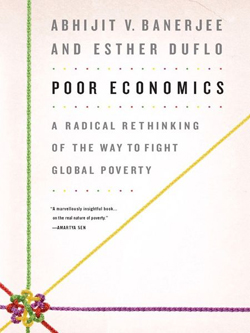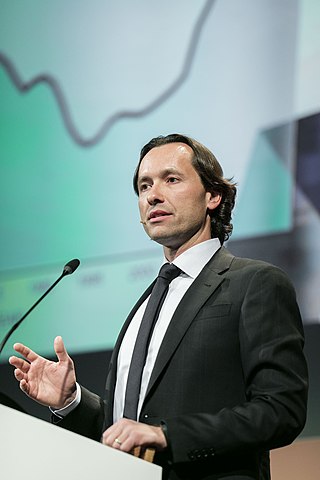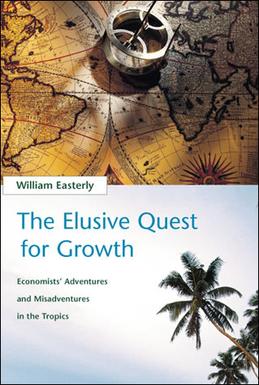The MIT Department of Economics is a department of the Massachusetts Institute of Technology in Cambridge, Massachusetts.

Michael Robert Kremer is an American development economist who is University Professor in Economics And Public Policy at the University of Chicago. He is the founding director of the Development Innovation Lab at the Becker Friedman Institute for Economics. Kremer served as the Gates Professor of Developing Societies at Harvard University until 2020. In 2019, he was jointly awarded the Nobel Memorial Prize in Economics, together with Esther Duflo and Abhijit Banerjee, "for their experimental approach to alleviating global poverty."
George Jesus Borjas is a Cuban-American economist and the Robert W. Scrivner Professor of Economics and Social Policy at the Harvard Kennedy School. He has been described as "America’s leading immigration economist" and "the leading sceptic of immigration among economists". Borjas has published a number of studies that conclude that low-skilled immigration adversely affects low-skilled natives, a proposition that is debated among economists.
PublicAffairs is a book publishing company located in New York City and has been a part of the Hachette Book Group since 2016.

Esther Duflo, FBA is a French–American economist who is a professor of Poverty Alleviation and Development Economics at the Massachusetts Institute of Technology (MIT). She is the co-founder and co-director of the Abdul Latif Jameel Poverty Action Lab (J-PAL), which was established in 2003. She shared the 2019 Nobel Memorial Prize in Economic Sciences with Abhijit Banerjee and Michael Kremer, "for their experimental approach to alleviating global poverty".

Abhijit Vinayak Banerjee is an Indian-American economist who is currently the Ford Foundation International Professor of Economics at Massachusetts Institute of Technology. Banerjee shared the 2019 Nobel Memorial Prize in Economic Sciences with Esther Duflo and Michael Kremer "for their experimental approach to alleviating global poverty". He and Esther Duflo, who are married, are the sixth married couple to jointly win a Nobel Prize.

Seva Mandir is a grassroots NGO based in Udaipur, in the Rajasthan state of India founded by Dr. Mohan Sinha Mehta in 1968. The organisation turned 50 in 2018. Seva Mandir works mainly in natural resource development and sustainability, village development, women empowerment, education and health care, continuing education, and children's welfare.

The Abdul Latif Jameel Poverty Action Lab (J-PAL) is a global research center working to reduce poverty by ensuring that policy is informed by scientific evidence. J-PAL conducts randomized impact evaluations to answer critical questions in the fight against poverty, and builds partnerships with governments, NGOs, donors, and others to generate new research, share knowledge, and scale up effective programs.

Dean Karlan is an American development economist. He is Professor of Economics and Finance at Northwestern University where, alongside Christopher Udry, he co-founded and co-directs the Global Poverty Research Lab at Kellogg School of Management. Karlan is the president and founder of Innovations for Poverty Action (IPA), a New Haven, Connecticut, based research outfit dedicated to creating and evaluating solutions to social and international development problems. He is also a Research Fellow and member of the Executive Committee of the board of directors at the Abdul Latif Jameel Poverty Action Lab (J-PAL) at the Massachusetts Institute of Technology. Along with economists Jonathan Morduch and Sendhil Mullainathan, Karlan served as director of the Financial Access Initiative (FAI), a consortium of researchers focused on substantially expanding access to quality financial services for low-income individuals.

Joe Madiath is an Indian social entrepreneur. He is the founder and former executive director of Gram Vikas, a non-governmental organisation based in Odisha, India. Gram Vikas uses common concerns for water and sanitation to unite and empower rural communities, including adivasi communities.

Poor Economics: A Radical Rethinking of the Way to Fight Global Poverty (2011) is a non-fiction book by Abhijit V. Banerjee and Esther Duflo, both professors of Economics at Massachusetts Institute of Technology (MIT) and Nobel Memorial Prize in Economic Sciences laureates. The book reports on the effectiveness of solutions to global poverty using an evidence-based randomized control trial approach. It won the 2011 Financial Times and Goldman Sachs Business Book of the Year Award.

Edward "Ted" Andrew Miguel is the Oxfam Professor of Environmental and Resource Economics in the Department of Economics at University of California, Berkeley, US. He is the founder and faculty director of the Center for Effective Global Action (CEGA) at U.C. Berkeley.

The Elusive Quest For Growth: Economists’ Adventures and Misadventures in the Tropics is a 2001 book by World Bank development economist William Easterly. Upon its release, the book received acclaim from such figures as Bruce Bartlett, Robert Solow, and Paul Romer, and has since become widely cited in the Economic Development literature.
The impact of microcredit is a subject of much controversy. Proponents state that it reduces poverty through higher employment and higher incomes. This is expected to lead to improved nutrition and improved education of the borrowers' children. Some argue that microcredit empowers women. In the US and Canada, it is argued that microcredit helps recipients to graduate from welfare programs. Critics say that microcredit has not increased incomes, but has driven poor households into a debt trap, in some cases even leading to suicide. They add that the money from loans is often used for durable consumer goods or consumption instead of being used for productive investments, that it fails to empower women, and that it has not improved health or education.

Juggernaut Books is digital book publishing house headquartered in New Delhi, India. The publisher emphasizes on short length books written by new writers. It also allows writers to self-publish their books through their digital platform. The digital books are distributed via their website and mobile apps. They also power the content library of the Airtel Books app by Airtel. They also publish physical books, which are distributed and warehoused by Hachette India.
Jeanne Lafortune is a Canadian economist who currently works as an Full Professor in Economics and Director of Research at the Pontifical Catholic University of Chile. She is also a researcher at the Abdul Latif Jameel Poverty Action Lab, which is a global research center that aims to reduce poverty and improve life quality of people in the Caribbean and Latin America. Lafortune holds a Ph.D. in Economics from the Massachusetts Institute of Technology (MIT), Cambridge, Massachusetts. Her research interests focus on three main fields, including economic history, family and development economics.
The 2019 Nobel Memorial Prize in Economic Sciences was awarded jointly to the economist couple Abhijit Banerjee, Esther Duflo-Banerjee and their colleague Michael Kremer "for their experimental approach to alleviating global poverty." Banerjee and Duflo are the sixth married couple to jointly win a Nobel Prize. The pressed release of the Royal Swedish Academy of Sciences noted:
"The research conducted by this year's Laureates has considerably improved our ability to fight global poverty. In just two decades, their new experiment-based approach has transformed development economics, which is now a flourishing field of research. They have laid the foundations of the best way to design measures that reduce global poverty"











